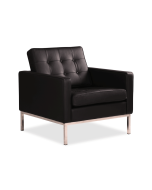Florence Knoll style 3-seater sofa
THE PRODUCT
- Florence Knoll style 3-Seater Sofa
- Available in a range of cashmere, classic and premium leather
- Matching Florence Knoll Style 2 Seater Sofa and Florence Knoll Style Armchair also available
Florence Knoll Style 3-Seater Sofa
Florence Knoll is an American architect who also designs furniture – as she felt architects should – although she memorably and modestly once described her designs as the ‘meat and potatoes’, intended only to fill a gap. She studied under Mies van der Rohe and his influence can be seen in her 1954 sofas – the perfect complement to his Barcelona chair simple, streamlined, yet luxurious pieces that work anywhere, combining effortlessly with vintage and contemporary designs. Her one-seat, two-seat and corner sofa designs are also available, all in aniline leather or a cashmere/wool blend.
The story behind the Florence Knoll Style 3-Seater
Saturated in history, culture and design, Florence Knoll is impressive even by Italian standards. The city shares its name with the sofa’s designer, who first introduced this piece back in 1954. Sharing your name with a city of such distinction carries a heavy burden of expectation and demands courage, especially when you have chosen design as your passion and vocation. However, Florence Knoll’s iconic classic fully lives up to these lofty expectations as her 2-Seater sofa has graced private living rooms, hotel lobbies and offices all over the world for more than 50 years.
THE DETAILS
- SKU :SOF130201
- Volume m3 : 1.386 kg
- Packaging Dimensions : 237 x 86 x 68 cm
- Material :ANILINE LEATHER
- Colour :Brown
- Size : No
- Width : 229 cm
- Height : 81 cm
- Depth : 81 cm
- Seating height : 45 cm

ABOUT THE DESIGNER
Florence Knoll
1917 (United States)
American architect and furniture designer, Florence Knoll Bassett was born in Michigan in 1917. She studied under Mies van der Rohe and Eliel Saarinen, before becoming a protégé of Eliel’s son, Eero Saarinen. In 1946, Florence married Hans Knoll and formed Knoll Associates, which worked to revolutionise interior space planning. They believed in “total design”, which embraced architecture, manufacturing, interior design, textiles, graphics, advertising and presentation. Florence’s application of these design principles to solve space problems transformed the standard practices of the 1950s and is still widely used today. For her outstanding contributions to architecture and design, Florence Knoll was accorded the National Endowment for the Arts' prestigious 2002 National Medal of Arts.





